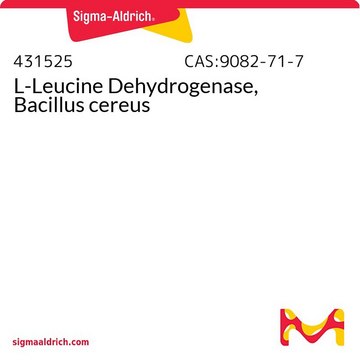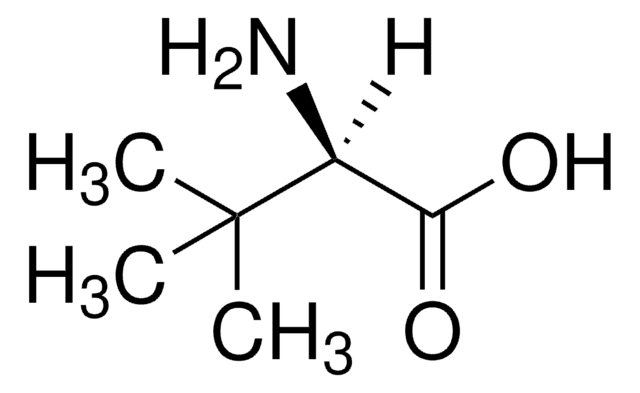L5135
L-Leucine Dehydrogenase from Bacillus cereus
lyophilized powder, ≥60 units/mg protein
Synonym(s):
L-Leucine:NAD+ oxidoreductase (deaminating)
Sign Into View Organizational & Contract Pricing
All Photos(1)
About This Item
CAS Number:
MDL number:
UNSPSC Code:
12352204
NACRES:
NA.54
Recommended Products
form
lyophilized powder
Quality Level
specific activity
≥60 units/mg protein
mol wt
245 kDa
storage temp.
−20°C
Looking for similar products? Visit Product Comparison Guide
General description
L-Leucine Dehydrogenase is a member of the amino acid dehydrogenase family.
Application
L-Leucine Dehydrogenase from Bacillus cereus has been used to determine the branched-chain amino acids (BCAA) spectrophotometrically in serum samples.
Biochem/physiol Actions
Leucine Dehydrogenase is a nicotinamide adenine dinucleotide hydrogen (NADH)-dependent oxidoreductase. It is involved in catalyzing the reductive amination of aliphatic 2-oxo-acids to their respective L-amino acids.
Unit Definition
One unit will convert 1.0 μmole of L‑leucine to α-ketoisocaproate per min at pH 10.5 at 37 °C.
Other Notes
contains lysine
Storage Class Code
11 - Combustible Solids
WGK
WGK 3
Flash Point(F)
Not applicable
Flash Point(C)
Not applicable
Personal Protective Equipment
dust mask type N95 (US), Eyeshields, Gloves
Choose from one of the most recent versions:
Already Own This Product?
Find documentation for the products that you have recently purchased in the Document Library.
K Selber et al.
Journal of chromatography. B, Biomedical sciences and applications, 743(1-2), 21-30 (2000-08-15)
Mathematical strategies were applied to optimise the extraction of recombinant leucine dehydrogenase from E. coli homogenates and endoglucanase 1 from culture filtrates of Trichoderma reesei in polyethylene glycol-phosphate systems. The goal was to test mathematical tools which could facilitate the
M B Ansorge et al.
Applied microbiology and biotechnology, 53(6), 668-673 (2000-08-05)
The established Escherichia coli expression vectors ptrc99a, pKK223-3, pPLlambda, pAsk75, pRA95, and pRA96, which differ in copy number, mode of induction, selection marker, and use of par sequences for stabilization, were investigated for the stable expression of recombinant L-leucine dehydrogenase
S Guangdong et al.
The Journal of antibiotics, 54(1), 66-73 (2001-03-28)
Shengjimycin is a group of 4"-acylated spiramycins with 4"-isovalerylspiramycin as the major component, produced by recombinant S. spiramyceticus F21 harboring a 4"-O-acyltransferase gene from S. mycarofaciens 1748. A stable bioengineered strain of Streptomyces spiramyceticus WSJ-1 was constructed by integrating the
Peng-Hu Zhang et al.
Sheng wu gong cheng xue bao = Chinese journal of biotechnology, 23(2), 268-272 (2007-04-28)
The purification and the characteristics of an enzyme from Morganella morganii J-8, which could produce d-pseudoephedrine from 1-phenyl-2-methylamine-acetone, were performed in this study. In this research, first, cells were disrupted by ultrasonic treatment at 4 degrees C. The carbonyl enantioselective
Tatyana A Muranova et al.
Acta crystallographica. Section D, Biological crystallography, 58(Pt 6 Pt 2), 1059-1062 (2002-05-31)
Leucine dehydrogenase is an octameric enzyme which belongs to the superfamily of amino-acid dehydrogenases and catalyses the reversible oxidative deamination of leucine to 2-ketoisocaproate, with the corresponding reduction of the cofactor NAD(+). Catalysis by this enzyme is thought to involve
Our team of scientists has experience in all areas of research including Life Science, Material Science, Chemical Synthesis, Chromatography, Analytical and many others.
Contact Technical Service






